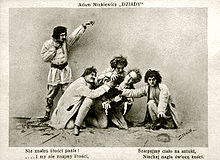
Back Дзяды (паэма) Byelorussian Дзяды (паэма) BE-X-OLD Totenfeier (Drama) German Dziady (poema) Spanish جادی (درام) Persian Dziady (drame) French Vėlinės (poema) Lithuanian Dziady (dramat) Polish Дзяды (поэма) Russian Дзяди (поема) Ukrainian

Dziady (Polish pronunciation: [ˈdʑadɨ], Forefathers' Eve) is a poetic drama by the Polish poet Adam Mickiewicz. It is considered one of the greatest works of both Polish and European Romanticism.[1][2][3] To George Sand and Georg Brandes, Dziady was a supreme realization of Romantic drama theory, to be ranked with such works as Goethe's Faust and Byron's Manfred.[3]
The drama's title refers to Dziady, an ancient Slavic and Lithuanian feast commemorating the dead (the "forefathers"). The drama has four parts, the first of which was never finished. Parts I, II and IV were influenced by Gothic fiction and Byron's poetry. Part III joins historiosophical and individual visions of pain and annexation, especially under the 18th-century partitions of Poland. Part III was written ten years after the others and differs greatly from them. The first to have been composed is "Dziady, Part II", dedicated chiefly to the Dziady Slavic feast of commemoration of the dead which laid the foundations of the poem and is celebrated in what is now Belarus.[4]
A ban on the performance of the play was an aspect of the 1968 Polish political crisis.
- ^ G. Olivier, Poema Dziady in Cabinet de Lecture, 26 April 1834.
- ^ A. Segalas in Journal des Femmes. Gymnase Litteraire, 14 June 1834.
- ^ a b G. Sand, Goethe - Byron - Mickiewicz in Revue des Deux Mondes, 1 December 1839.
- ^ (in Russian) Лапидус Н. И., Малюкович С. Д. Литература XIX века. М.: Университетское, 1992. P.135
© MMXXIII Rich X Search. We shall prevail. All rights reserved. Rich X Search